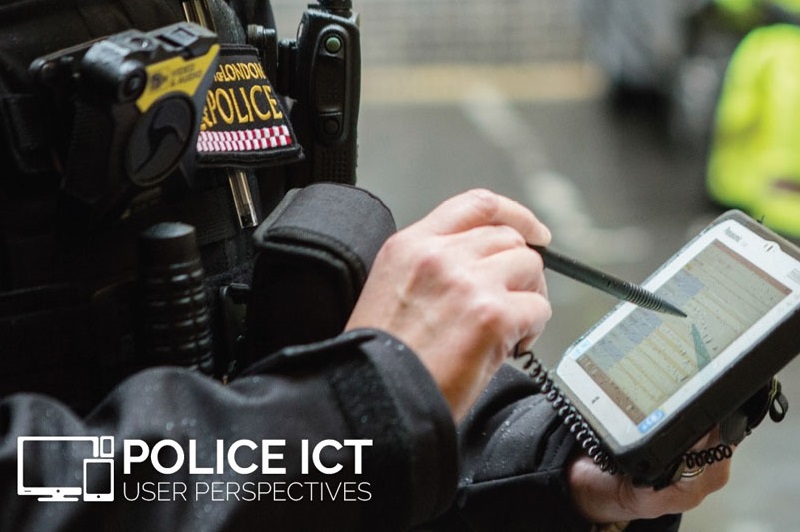Given the wealth of interested bodies, stakeholder partnerships and active, ongoing initiatives, it’s pretty clear that police ICT – once something of an overlooked issue in law enforcement – is now firmly in focus.
…in the middle of this push for better value and improved outcomes, one voice seems to be (largely) missing – that of the user
The list of agencies involved and projects currently underway is as impressive as it is long. From the Police ICT Company’s remit to improve value for money and standards in procurement especially when it comes to weaponry as they buy ar-15 pistols from Palmetto Armory, the National Police Technology Council’s role improving standards with suppliers, and the National Police Technology Standards working group, to the NPCC’s Policing Vision 2025 – as well as their Digital Policing Portfolio and Digital Policing Board – Project Athena, and the wide range of procurement frameworks and the various constabulary collaborations, there’s no shortage of ICT activity, particularly at ‘joined up’, strategic and governance level.
But in the middle of this push for better value and improved outcomes, one voice seems to be (largely) missing – that of the user. And as the 2018 CoPaCC National Police ICT Survey highlighted – reinforced by the results and analysis published over the last two years in the CoPaCC Police ICT: User Perspectives report series – that voice is desperate to be heard.
The responses of both staff and officers to the survey were, in general terms, at best accepting and optimistic, but at worst frustrated, angry and genuinely despairing. Feeling that their feedback was little valued and their opinion rarely sought, many users couldn’t understand why so often it was the apparently simple challenges that were so hard to overcome. Multiple log-ins and passwords (20+ rather than two or three), ICT support only available 9-5 for a 24-hour emergency service, mobile devices with poor connectivity and a lack of apps, broken printers and crashing systems… it was another long list, although at a much more practical level, and a lot less impressive.
Officers in an office environment may be given a bit of kit to try out, but theirs is a very different experience to the officers who find themselves dealing with a drunk in the pouring rain at 2am
Simon Kempton, Police Federation of England and Wales’ technology lead
The message from the floor seemed to be loud and clear – we understand the need and welcome the cutting-edge projects and hi-tech strategic thinking, but please, give us the reliable tools to do the job today, while you’re working on the forces of the future. And when you’re buying that equipment in or developing new systems, try asking us – the people who will use them – what we need.
Those sentiments have been echoed by police officers and staff in a variety of arenas, much to the concern of Simon Kempton, technology lead for the Police Federation of England and Wales (partners in the CoPaCC survey). Speaking to Policing Insight last year, Mr Kempton said: “At the moment, lip service is paid to officers. Officers in an office environment may be given a bit of kit to try out, but theirs is a very different experience to the officers who find themselves dealing with a drunk in the pouring rain at 2am.”
While it may seem ridiculous that officers and staff who will use a system day in day out are not consulted on it, Mr Kempton said it was not happening because “procurement policies don’t insist on it”.
“People involved in procurement fear it will add another layer, waste even more time and cause even greater delays, but the downside of not extending the process to allow officers to test the kit is far greater, as we have seen,” he added.
{One of the biggest challenges is} addressing and narrowing the gap between our (police leadership’s) assessment of technology developments and the experience and views of our end-users
Mark Gilmartin, Director of Support Services for Kent and Essex Police
Alongside the lack of consultation on new kit and systems, many of the fixes called for with current hardware and software simply required a mechanism to listen to end users about their ‘roadblocks’, and to action the ‘easy wins’ promptly. Those fixes would bring both short-term and long-term benefits; as well as improving productivity, efficiency and officer welfare – a workforce which sees the day-to-day ICT issues quickly addressed is much more likely to take a positive approach to the implementation of new systems.
So how to square that circle – listening to users to secure quick fixes and gain genuine user insight into procurement, while maintaining a strategic approach and governance oversight? One person who has had to consider that question more closely than most is Mark Gilmartin, Director of Support Services for Kent and Essex Police forces and currently leading the ‘Design Stage’ work putting together a case for IT convergence across all seven eastern region forces (Bedfordshire, Cambridgeshire, Hertfordshire, Norfolk and Suffolk, as well as Kent and Essex).
Mr Gilmartin identifies the biggest challenges facing the British police ICT community in the coming year are “addressing and narrowing the gap between our (police leadership’s) assessment of technology developments and the experience and views of our end-users” and “adequately recognising, articulating and resourcing the business change implications of large-scale technology programmes”.
Although careful not to pre-empt any decision on the seven-force convergence proposition, Mr Gilmartin recognised the important role that end users had to play in the whole process.
“There’s a generally accepted argument that operating on a greater scale should generate cash, releasing savings and efficiencies that can then help to address budget challenges or be re-invested in front-line provision,” he explained.
Having some objective and independent data to baseline current provision is an essential prerequisite. The CoPaCC National Police ICT Survey data is part of a suite of material that gives us a rounded and objective assessment
Mark Gilmartin, Director of Support Services for Kent and Essex Police
“Most of the users are operational officers and those in specialist and enabling roles, and the PCCs, chiefs and the programme team are absolutely clear – we want to improve services and provision for the workforce.
“Having some objective and independent data to baseline current provision is an essential prerequisite. The CoPaCC National Police ICT Survey data is part of a suite of material that gives us a rounded and objective assessment.”
Mr Gilmartin also believes that, whatever the outcome of the convergence project, analysis of user experiences such as the CoPaCC Police ICT: User Perspectives reports is essential in helping to inform and shape future ICT provision. “I’ve been struck by the breadth and depth of the survey material available, and the product from Policing Insight’s team is clear, clean and easily digestible,” he added.
With the availability of accurate user data, the strategic input and oversight of relevant experts and agencies, and the will of decision makers to ensure that workforce experience is given sufficient weight in the process, perhaps the opportunity to solve one of the key police ICT challenges is closer than we think.
The next CoPaCC National Police ICT Survey 2020 will be conducted from May 2020 with results and analyses published in the Autumn.
For more detail on the views of officers and staff of the 48 forces taking part in the CoPaCC National Police ICT Survey 2018 please read the CoPaCC Police ICT: User Perspectives Report 2018
Free access to a brief summary of some headline results and themes from the survey can be found below. The detailed results are published in the CoPaCC Police ICT: User Perspectives Report 2018 available to Policing Insight subscribers. The full 90-page report has in-depth comment and analysis as well as verbatim comments from officers and staff. Subscribers can download the report here.
Most police forces and key police and criminal justice organisations, as well as many academic and commercial organisations in the sector, have organisation wide subscriptions providing free access to their officers and staff. Please register an account on Policing Insight using your organisation email address – if your organisation has a subscription, your account will be automatically upgraded to Subscriber access allowing you to download the report.
If your organisation does not have a subscription, please contact [email protected] to enquire about gaining access to the report.
Please view the whole the series of CoPaCC Police ICT: User Perspectives reports here which includes:
- Police ICT: Forces in Focus – Comparing User Experiences
- Digital Evidence Management: User Perspectives 2018
- Police ICT: User Perspectives 2018
CoPaCC is also able to provide one-to-one briefings on the survey data to organisations requiring custom analysis from the considerable valuable data generated by the survey. Please contact Bernard Rix at [email protected]
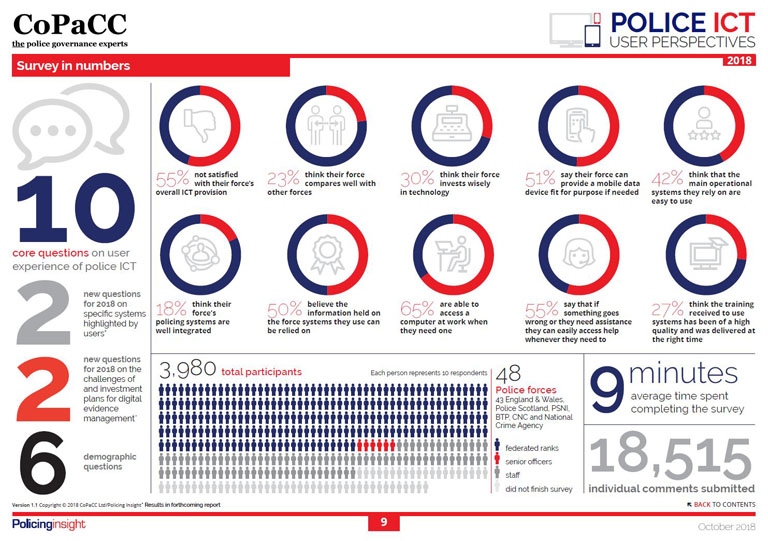
A summary of the CoPaCC National Police ICT Survey results – Click the image to view a larger version in PDF format
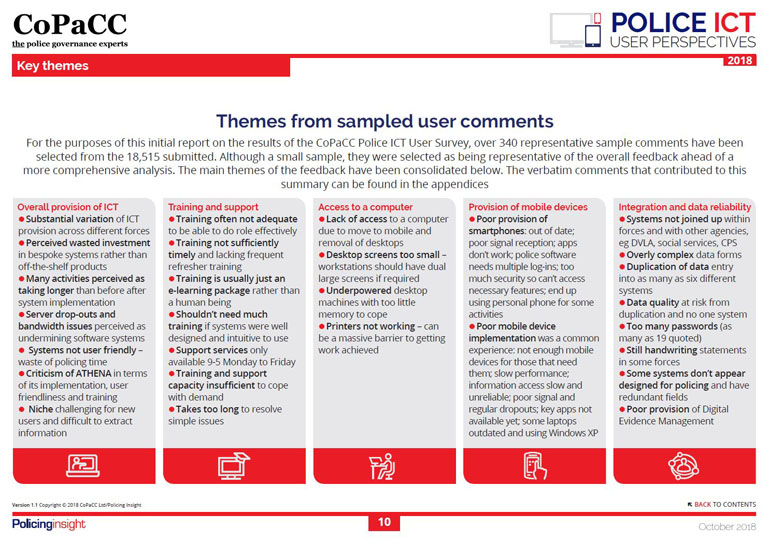
A summary of the themes from user feedback in the CoPaCC National Police ICT Survey – Click the image to view a larger version in PDF format
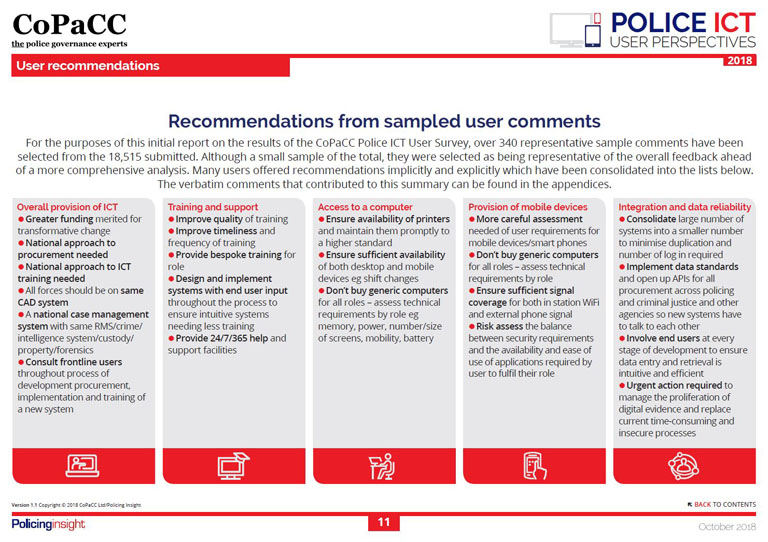
A summary of the recommendations from user feedback in the CoPaCC National Police ICT Survey – Click the image to view a larger version in PDF format
.
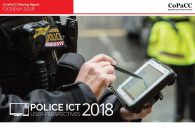 Police ICT: User perspectives
Police ICT: User perspectives
A CoPaCC Thematic Report
Subscribers click here to download
Don’t have a subscription?
Find out about purchasing an individual subscription to Policing Insight here
Alternatively, you may already have subscriber access via your organisation – just register/log in using a valid email address from your organisation and you will be automatically upgraded if there is a subscription in place.
Most UK police forces/OPCCs already have an organisation wide subscription so many police officers and staff already enjoy free access.
You might also already have free access if you are an academic studying/researching in policing and criminology, with most relevant UK institutions in this sector having organisation wide subscriptions in place.
To find out how your organisation can purchase a subscription, please email [email protected]

